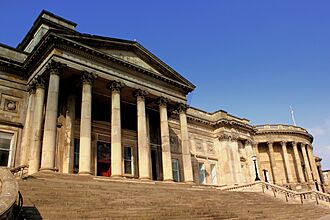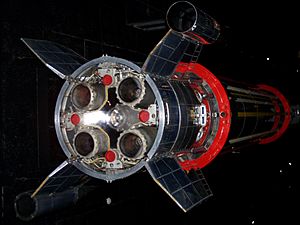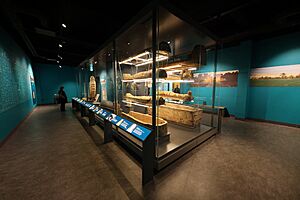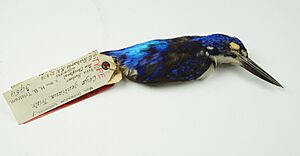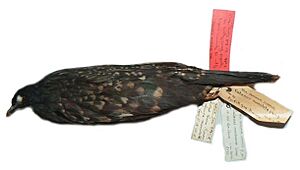World Museum facts for kids
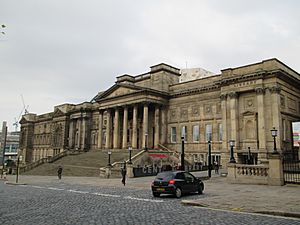
World Museum, with the entrance to Liverpool Central Library on the right
|
|
| Former name | Derby Museum Liverpool Museum |
|---|---|
| Established | 1851 |
| Location | William Brown Street, Liverpool, England, United Kingdom |
| Visitors | 672,514 (2019) |
The World Museum in Liverpool, England, is a super cool place to explore! It's a big museum filled with amazing collections about archaeology (studying old stuff), ethnology (studying cultures), and all sorts of natural and physical sciences. You can even visit a planetarium and a Natural History Centre. The best part? It's free to get in! This museum is part of National Museums Liverpool.
Discovering the Museum's Past
The World Museum started its journey a long time ago. It first opened in 1851 and was called the Derby Museum. It began with a huge collection of natural history items from the 13th Earl of Derby. At first, it shared just two rooms with a library.
A New Home for Growing Collections
The museum quickly became very popular, so it needed a bigger, special building. A kind local politician and merchant, Sir William Brown, donated land and money for the new building. This new home, on what is now William Brown Street, opened in 1860. About 400,000 people came to see it!
As the years passed, the museum's collections kept growing. By the late 1800s, it needed even more space. An extension was built and opened in 1901, adding more room for exhibits and a college of technology.
Rebuilding After Challenges
During The Blitz in World War II, Liverpool was heavily bombed. In May 1941, the museum building was hit by firebombs and badly damaged. Many parts of the collection had been moved to safety, but some exhibits were destroyed. It took many years for parts of the museum to reopen.
In 2005, the museum had a big makeover that cost £35 million. This project doubled the display areas and made more collections available to visitors. A new central entrance and a six-story atrium were created. When it reopened, the museum changed its name to World Museum.
Exploring the Collections
The World Museum has many different areas to explore, each with fascinating exhibits.
Journey Through Space and Time
The physical sciences collection at World Museum grew after the damage from the 1941 bombing. It includes unique items from scientific experiments and old tools like an Equatorium, which was used to calculate planetary positions in the 1600s.
Visit the Planetarium
The World Museum has its very own planetarium! It opened in 1970 and was one of the first outside of London. It has 62 seats and welcomes about 90,000 visitors each year. You can watch shows about our Solar System, space exploration, and even special shows just for kids.
Discovering Human History
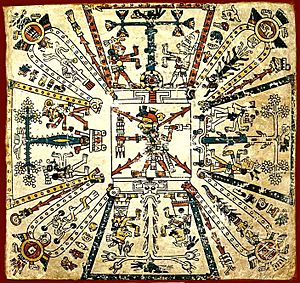
This section takes you back in time to learn about ancient civilizations and cultures.
Archaeology and Ancient Egypt
The museum has amazing archaeological items, including British objects like the Anglo-Saxon Kingston brooch.
The Egyptian collection is very important, with about 15,000 objects from Egypt and Sudan. These items range from prehistoric times to the Islamic period.
Many of these ancient Egyptian treasures were given to the museum in 1867 by Joseph Mayer, a local goldsmith. He wanted people in Liverpool to see the wonders of Egyptian civilization, just like those who could visit the British Museum in London. Over time, more people donated items, and the museum also helped fund excavations in Egypt to bring back more discoveries.
Even after the museum was damaged in 1941, efforts were made to rebuild and expand the Egyptian gallery. A new and improved gallery opened in 2008 and was further updated between 2015 and 2017.
World Cultures and Ethnology
The ethnology collection at World Museum is one of the best in the country. It features items from different cultures across Africa, the Americas, Oceania, and Asia. You can see many interesting objects and enjoy interactive displays that help you learn about people from all over the world.
Exploring Natural History
In the Natural World area, you can see all sorts of exhibits, including live insect colonies and historical animal and plant displays. The award-winning Clore Natural History Centre lets you get up close with the collections through interactive displays.
Amazing Animals: Vertebrate Zoology
The museum's original founder, the 13th Earl of Derby, donated many animal specimens in 1851. This included rare animals and "type specimens," which are standard examples for a species.
The museum also has specimens of several animals that are now extinct, meaning they no longer exist on Earth. These include the Liverpool pigeon, the great auk (an egg), the Falkland Islands wolf, the Passenger pigeon, and the dodo.
Sadly, many of the museum's animal displays were lost when the building was destroyed by fire in 1941. However, some mammal specimens and most of the bird skins from the original collection survived.
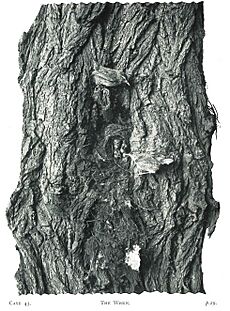
Today, the natural history gallery is called Endangered Planet. It features a limited number of stuffed animals in four dioramas, which are scenes showing different natural environments like the savanna, tropical rainforest, taiga, and tundra. You can even visit this gallery virtually online!
Plants and Botany
The museum's plant collections have grown a lot over the past 200 years. They include important specimens that show most of the native plants found in Britain and Ireland.
Earth's Story: Geology
The geology collection at World Museum has over 40,000 fossils, along with many rocks and minerals. These exhibits teach you about how our planet began, its structure, and its long history.
Much of the original geology collection was lost during World War II. However, the collection has expanded greatly since then, thanks to new acquisitions from other museums and universities.


